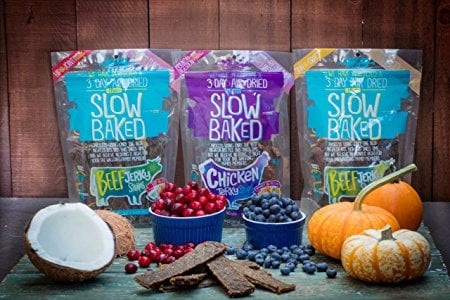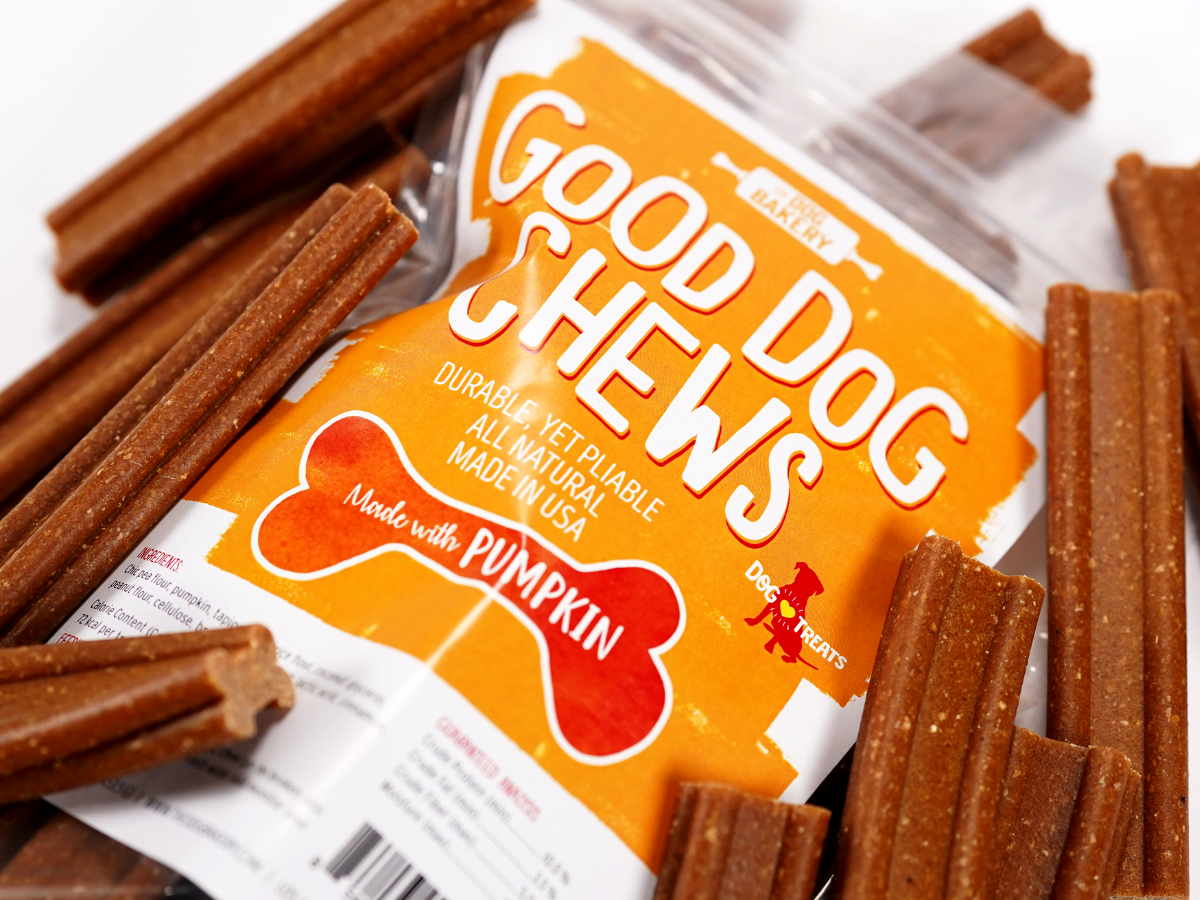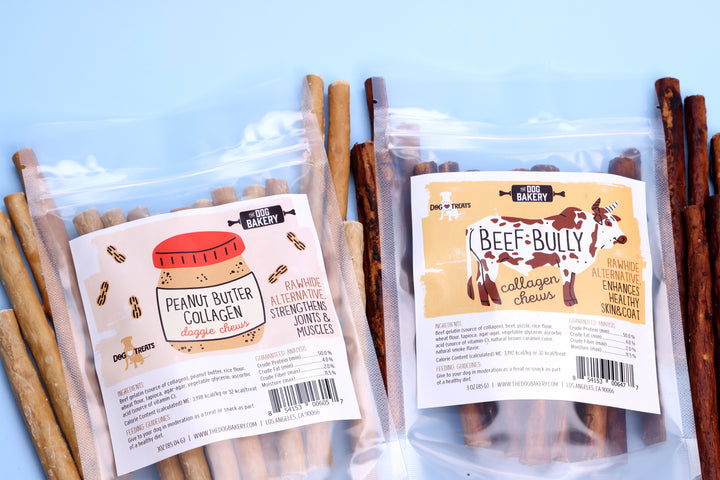Homemade Dog Food Recipes for Senior Dogs
As your dog enters their golden years, there are a few changes you can make to their diet to keep them happy and healthy. Many of the biggest changes that occur as a dog ages are metabolic, meaning that they have to do with the way your dog digests their food and uses the nutrients in it.
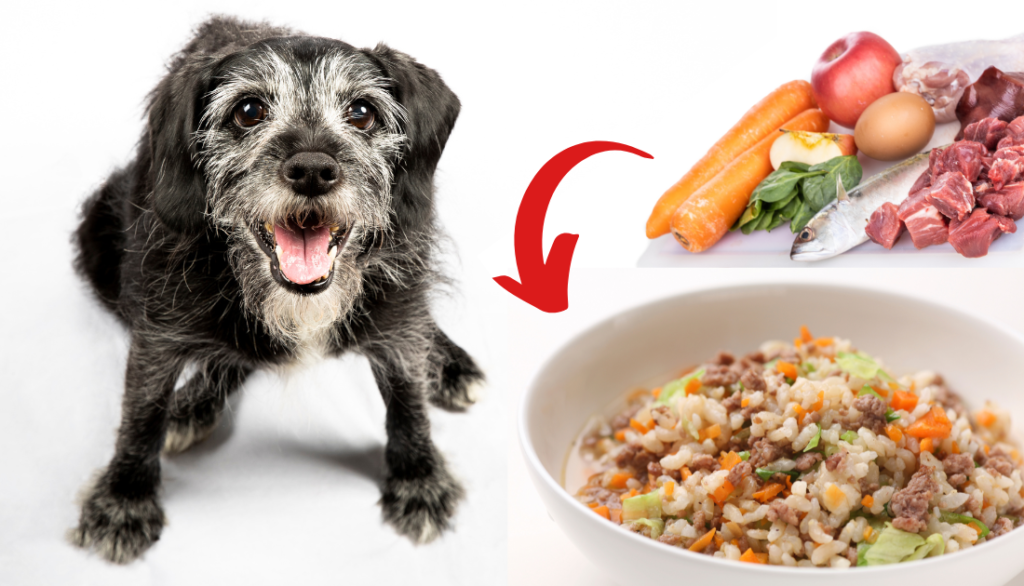
As pet parents, we want to do everything in our power to keep our senior dogs feeling great. One change that you may want to consider is feeding your dog a homemade diet. Today, we will share some of the best dog food recipes for older dogs and talk about how good nutrition can keep them feeling frisky as they age.
Should You Feed Your Senior Dog a Homemade Diet?
Yes, but only if you are committed to building a balanced homemade dog food. There are many benefits to feeding any dog a homemade diet, and senior dogs can especially benefit because you can customize their diet as they age to meet their needs precisely. While a diet is no substitute for regular veterinary care, the best homemade dog food recipes for senior dogs have great nutritional value and can help with many health issues that show up in older dogs.
Many veterinarians support homemade recipes for older dogs, and there are plenty of great recipes out there that have been created with veterinary input or by veterinary nutritionists. The bottom line is that if you are willing to put in the work to make sure the homemade dog food that you make is nutritionally balanced, your senior dog can thrive on home-cooked meals.
Benefits of Feeding Senior Dogs with Homemade Food
The biggest benefit of feeding senior dogs with homemade food is that you have complete control over the ingredients and nutrients present in their meals. You don’t have to shop around and feed a variety of brands to make sure that they’re getting everything that they require for their specific needs.
Here is a list of the top twenty nutrients senior dogs need in their diet:
| Nutrient | Function | Sources |
| Protein | Essential for growth, repair, and maintenance of tissues | Meat, fish, organ meats, grains |
| Carbohydrates | Primary source of energy for the body | Grains, potatoes, fruits, vegetables |
| Fat | Source of energy, helps with absorption of fat-soluble vitamins and supports skin and coat health | Meat, organ meats, bone, fish oil, flaxseed oil |
| Fiber | Supports digestion and elimination | Pumkin, flaxseeds, fruits, vegetables |
| Vitamin A | Necessary for a variety of bodily functions, including vision, immune function, and bone health | Liver, fish liver oil, egg yolks, sweet potato, carrots, kale |
| Vitamin D | Necessary for a variety of bodily functions, including vision, immune function, and bone health | Liver, fish, egg yolks, beef |
| B Vitamins | Play a role in energy production and nerve function | Liver, fish, eggs, chicken, leafy greens, game meats |
| Vitamin E | Necessary for a variety of bodily functions, including vision, immune function, and bone health | Eggs, fish, spinach, sunflower oil |
| Vitamin K | Necessary for a variety of bodily functions, including vision, immune function, and bone health | Leafy greens, liver, meat, egg yolks |
| Calcium | Essential for bone health, muscle function and nerve transmission | Raw meaty bones, sardines, salmon, eggs, crushed eggshell |
| Magnesium | Supports bone health, muscle function and energy production | Bone meal, pumpkin, leafy greens, fish |
| Potassium | Supports proper muscle and nerve function, and helps regulate fluid balance | Sweet potato, blueberries, carrots |
| Iron | Necessary for the formation of red blood cells and oxygen transport | Sardines, liver, raw egg yolk, leafy greens |
| Zinc | Supports immune function, skin and coat health, and wound healing | Red meat, fish, eggs |
| Copper | Important for bone and connective tissue health | Red meat, liver, fish, grains |
| Manganese | Supports bone health and energy production | Mussels, kelp, hemp seeds |
| Selenium | Important for immune function, antioxidant | Red meat, poultry, fish, grains |
| Iodine | Supports thyroid hormone production | Seaweed |
| Taurine | Supports eye and heart health | Red meat, poultry, organ meats |
| L-carnitine | Supports the metabolism | Red meat, fish, poultry |
| Omega-3 fatty acids | Supports immune function and skin and coat health, and can reduce inflammation | Fish, fish oils |
| Omega-6 fatty acids | Supports immune function and skin and coat health, and can reduce inflammation | Sunflower oil, safflower oil |
| Glucosamine | Supports joint health and can reduce joint pain and stiffness | Beef trachea, mussels, chicken feet, bone broth, meaty bones and cartilage |
| Chondroitin | Supports joint health and can reduce joint pain and stiffness | Fish, chicken feet, pig trachea |
How to Prepare Homemade Food for Senior Dogs: Nutrition
When making homemade food for your senior dog, it is important to consider the special health concerns that older dogs have.
Calorie Considerations for Senior Dogs
Older dogs often have slower metabolisms than younger pups, making it easier for them to gain weight and harder to lose it. Being overweight is really hard on a senior dog’s joints, so it’s a good idea to try to keep them lean. One of the easiest ways to do this is to keep your older dog on a low-carb diet, which is also easier on a senior dog’s pancreas.
Feeding Senior Dogs a High-Protein Diet
Senior dogs need more protein in their diet, not less. Muscle loss is very common in older pets, so much so that some dogs lose their ability to walk unassisted just due to muscle loss. According to the AKC, older dogs need about 50 percent more protein to maintain muscle mass compared to younger ones. When you’re making healthy dog food recipes for senior dogs, you should choose recipes that are 28% to 32% protein.
Senior Dog Health Considerations

Senior dogs have special health needs that can have a strong impact on the best food for them. Here are a few of the major considerations that you need to include when you make decisions about what to feed your senior dog.
1. Kidney Disease
Kidney issues are a common health concern for senior dogs. If your dog has kidney disease, they may require a special diet that is low in phosphorus, as well as protein and sodium. A diet with less phosphorus can help reduce the workload on the kidneys, which slow the progression of kidney disease and improves your furry friend’s quality of life.
Foods that are high in phosphorus, such as organ meats, fish, and dairy products, can be particularly bad for dogs with kidney disease. These foods should be avoided or fed in very small quantities. Your vet can recommend a specific diet for your senior dog with kidney disease that takes into account their unique nutritional needs.
2. Tooth Decay and Dental Disease
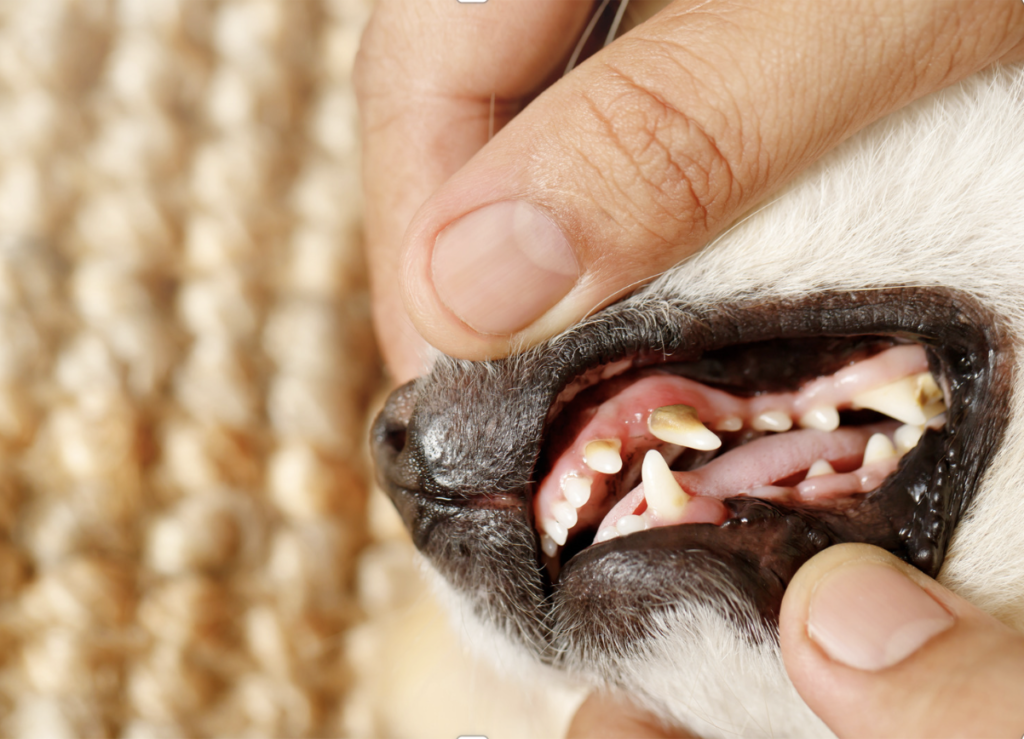
Old dogs often have dental problems that come with a long life. For these seniors, regular dog food’s texture can be highly unpleasant and difficult to chew. A soft homemade diet can be just the thing to make them more comfortable without sacrificing any of the nutrition they need. For these dogs, raw food is often a good choice, since it is naturally soft and easy to digest.
3. Practical Considerations when Making Food for Senior Dogs
Many senior dogs just don’t have the same appetite that they did when they were younger. This is another advantage of homemade dog food; it has a similar appeal as “people food” because it uses fresh ingredients and has a varied texture and complex taste.
Another practical consideration of homemade dog food is hydration. Senior dogs often have a hard time keeping up with the necessary water intake. This is another benefit of healthy dog food recipes for senior dogs: they have much more water in them than prepackaged foods. Dry, shelf-stable dog food like kibble has an extremely low moisture content, but fresh food still has plenty of water in the food itself.
For many pet parents, there is a lot of appeal in homemade dog food recipes, vet-approved. For senior dogs, these foods are appealing and have good nutritional value; for dog lovers, it’s heartwarming to see a senior pet come to life and attack their food bowl with gusto. Now that we’ve talked about the benefits of homemade dog food for seniors, let’s look at some of the best homemade dog food recipes.
Basic Homemade Food Recipe for Senior Dogs
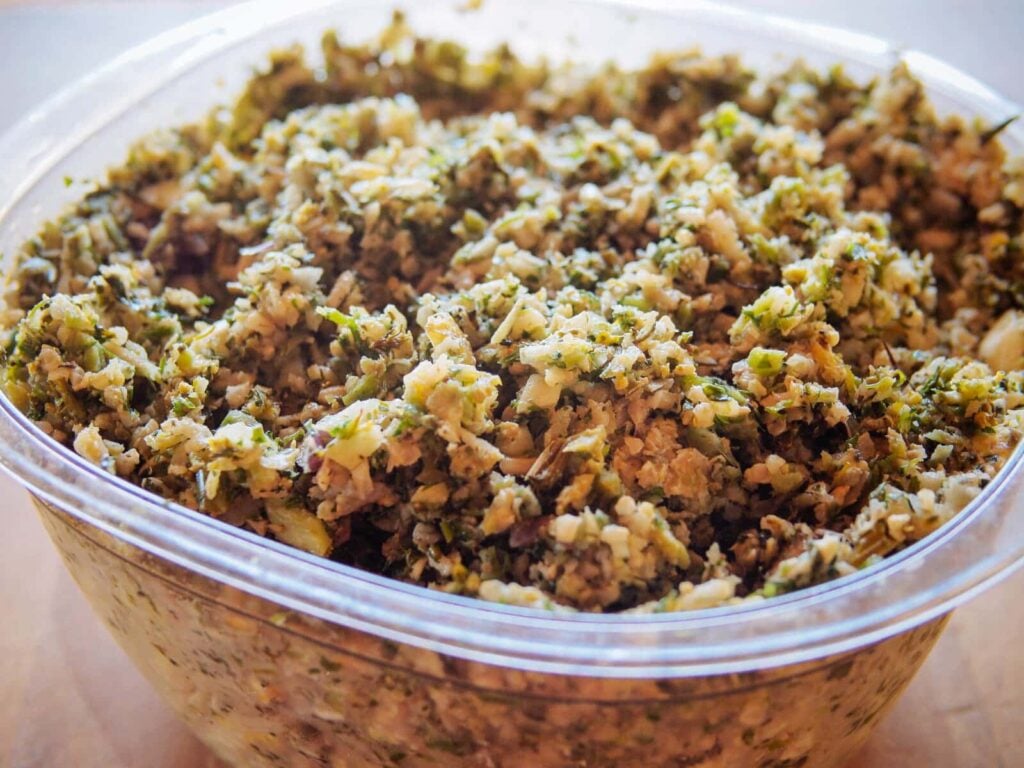
Source: Garden Betty
We love this easy-to-make, highly customizable homemade dog food recipe! It’s one of the best homemade dog food recipes for small senior dogs because it can easily be fed out in small portions that are healthy for them.
Ingredients
- 2 1/2 pounds raw boneless meat of choice
- 1 pound raw vegetables of choice
- 1 pound cooked complex carbohydrates (like grains, legumes, or starchy vegetables), cooled
- 4 clean crushed eggshells (learn more about adding eggshells to your dog’s food)
- 2 tablespoons coconut oil
- Ground turmeric
- 1 scoop of Critical Immune Defense nutritional supplement to garnish or crush SeniLife into the food.
Directions
- Heat a large skillet over medium-high heat. Melt the coconut oil in the skillet and coat the surface.
- Season the meat with ground turmeric. Add to skillet and saute on both sides until fully cooked.
- Transfer the meat to a cutting board. When cool enough to handle, coarsely chop the meat into 1-inch chunks..
- Coarsely chop the vegetables into 1-inch chunks.
- If your cooked complex carbohydrate is a grain or legume, leave it whole. If it’s a starchy vegetable, coarsely chop it into 1-inch chunks and set aside.
- Add the eggshells to the bowl of a food processor and pulse until finely crumbled.
- Add the meat and vegetables and pulse until finely chopped.
- Add the cooked carbs and pulse to combine. You want the mixture to be fluffy, not mushy.
- Transfer to a large bowl, cover, and refrigerate.
Important Notes
Recommended serving amounts are 2-4% of a dog’s body weight. If the eggshells aren’t farm fresh, leave them out and use eggshell powder instead.
Dog Food Recipe for Senior Dogs with Sensitive Stomachs
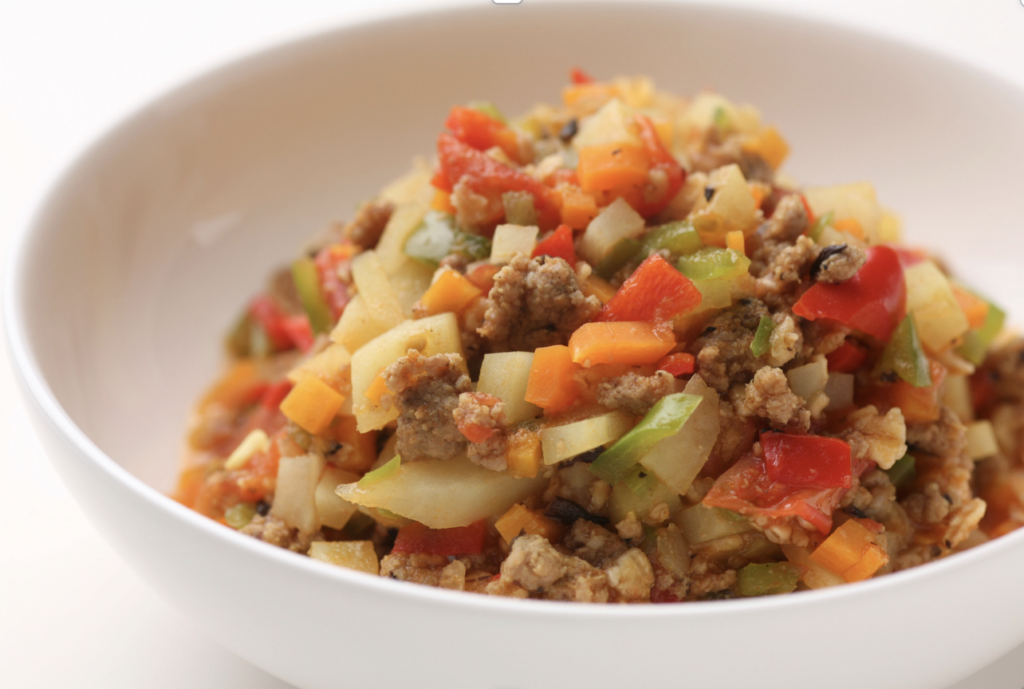
When making homemade dog food recipes for senior dogs with sensitive stomachs, you need to be thoughtful of your dog’s particular dietary needs. For example, some dogs with sensitive stomachs have food allergies, while others may be sensitive to a fatty diet. No matter why your dog’s stomach is sensitive, you’ll want to focus on feeding them easy-to-digest ingredients.
This recipe from Top Dog Tips for “Deerly Easy Dinner” is free from common allergens like poultry, beef, wheat, soy, and dairy, and is made from a lean novel protein to reduce the risk of causing irritation.
Ingredients
- 1 lb. venison (ground or cubed)
- 2 cups of sweet potatoes (diced)
- 8 oz. of frozen broccoli/cauliflower/carrots combo
- 1 tbsp. dried rosemary
- 6 cups of water
- 1 scoop of Critical Immune Defense nutritional supplement to garnish or crush SeniLife into the food.
Directions
- Put water, venison, sweet potatoes, and rosemary into a large Dutch oven or pot.
- Bring to a boil, stirring often. Reduce to low heat.
- Simmer for 20 minutes.
- Add frozen vegetables and simmer for 5 minutes more.
Important Notes
This dog food can be ladled into individual portions to freeze for later.
Nutritional Supplements
If you make your pup’s meals from a simple homemade dog food recipe, they may need nutritional supplements to make sure they’re getting the right amount of micronutrients, vitamins, and minerals. If that’s the case, there are some great supplements out there that will boost your furry friend’s health and keep them feeling their best.
1. Overall health: Critical Immune Defense

Made with a blend of clinically-proven ingredients, Critical Immune Defense targets your dog’s physical and cognitive health. Formulated by expert vet nutritionists, it offers eight essential benefits including support for normal cell growth and cancers, resilient joints, heart health, mental sharpness, digestion and immunity, mental sharpness, anxiety. Order Now
2. Digestive health: Honest Paws Well Prebiotics
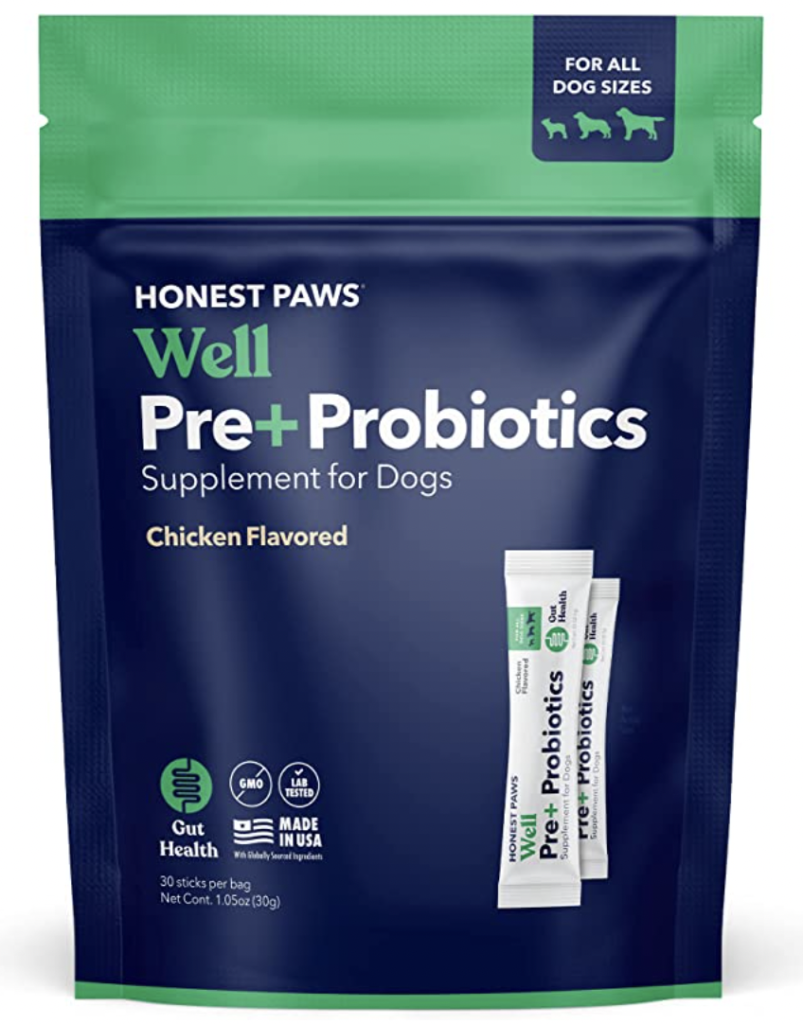

3. Mobility and joint health: Plano Paws Glucosamine Activ Treats
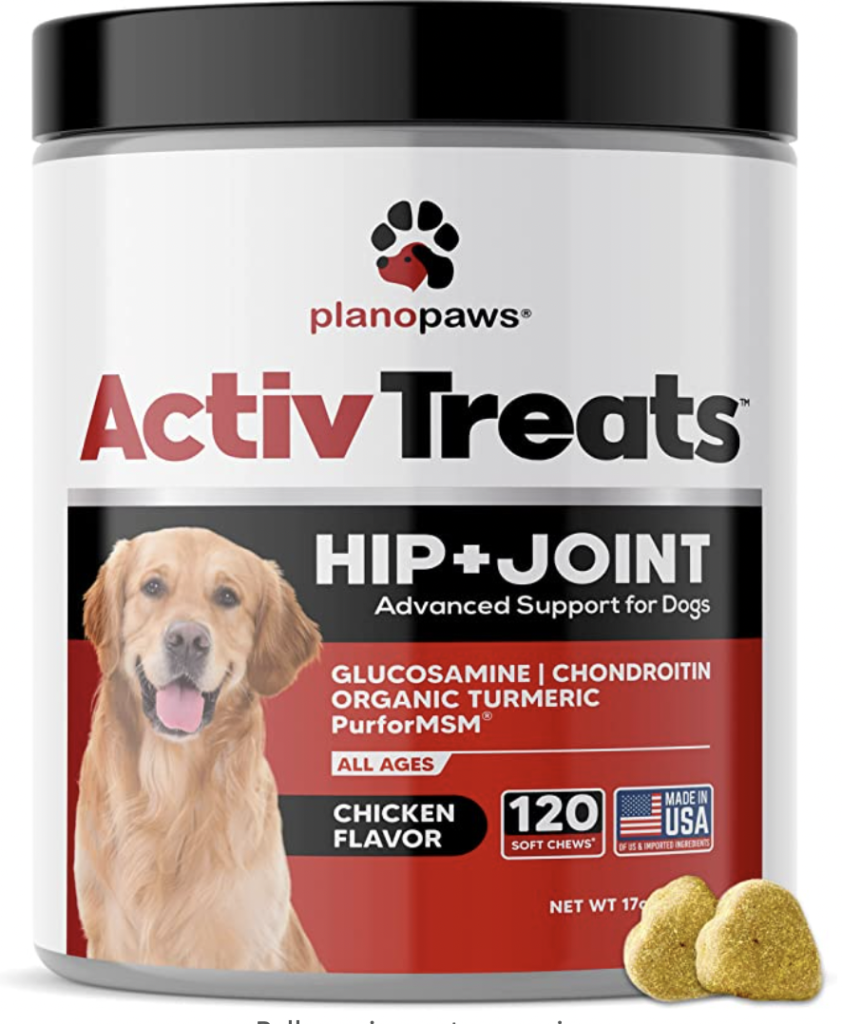

4. Omega-3 fatty acids: Vets Preferred Wild Alaskan Salmon Oil
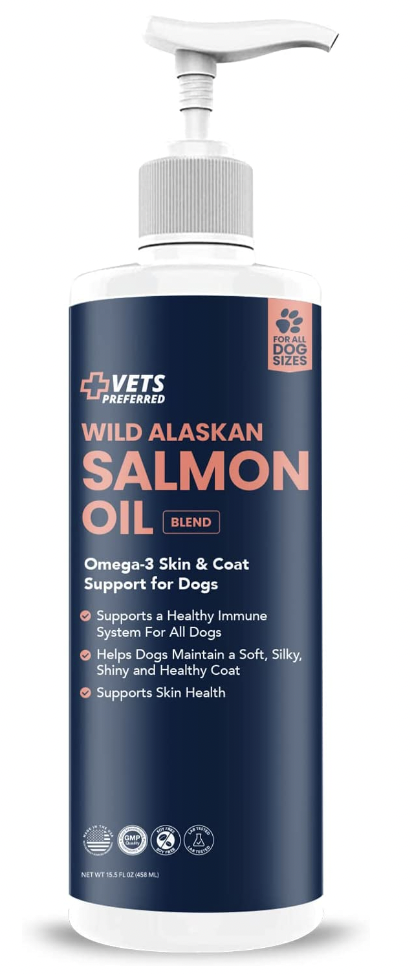

5. Skin and coat health: PetLab Co. Skin and Coat
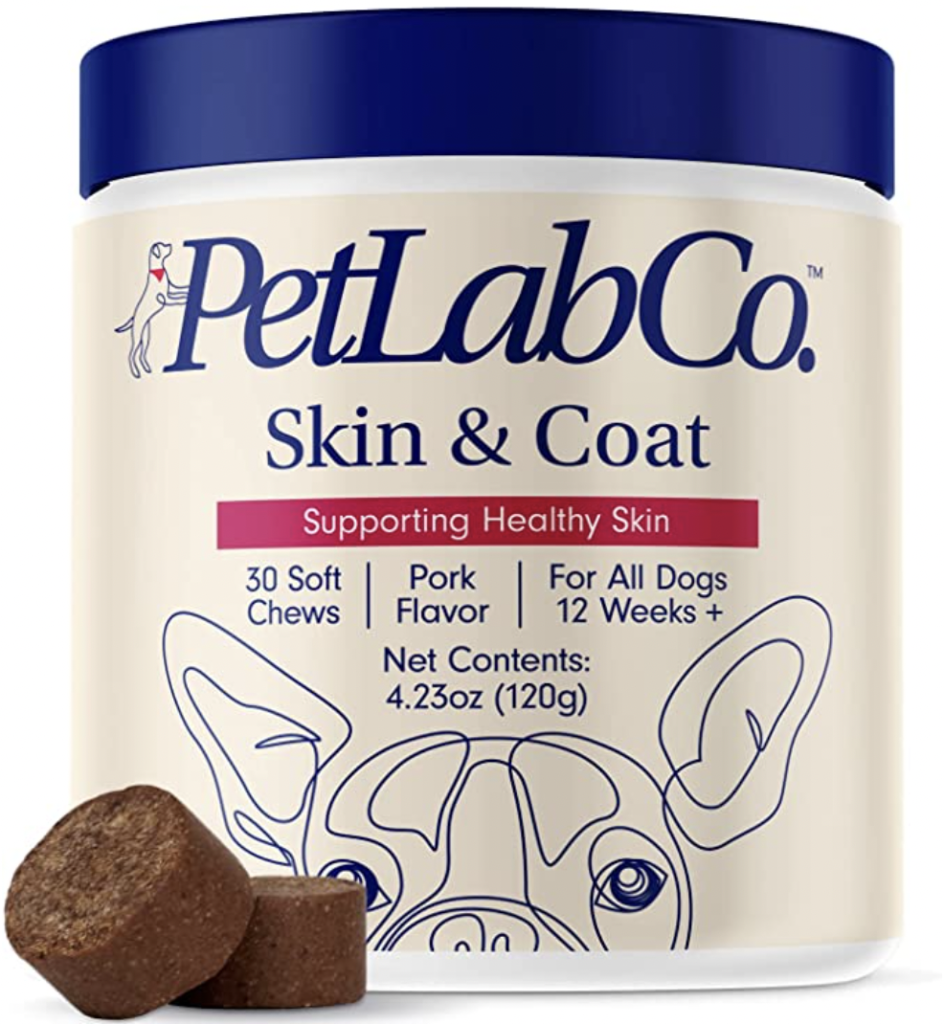

Homemade Dog Food Recipes for Senior Dogs FAQs
Want to know more about the best homemade recipes for senior dogs? Here are questions asked by pet parents just like you!
What can I make for my elderly dog to eat?
You have lots of options for making food for an elderly dog. See above for two healthy recipes for senior dogs!
How much homemade food should I feed my senior dog?
This depends on the size of your dog, the amount of calories in the food you make, and the dog’s activity level. Consult your veterinarian about how much nutrition your dog needs each day and use a dog food calorie calculator to figure out exactly how much to feed them.
Are eggs good for senior dogs?
Yes, eggs are great for all dogs– seniors included! Eggs are a great source of protein and heart healthy fats, and you can even feed dogs eggshells if they need more calcium.
What vegetables are good for senior dogs?
Many vegetables are good for senior dogs, including carrots, broccoli, spinach, sweet potatoes, green beans, brussels sprouts, and pumpkin.
Why do vets not like homemade dog food?
Vets are often reluctant to recommend a homemade diet for dogs because their owners are not trained or certified canine nutritionists. Dogs require a carefully balanced diet, and the wrong foods can seriously impact their health and longevity. Vets are simply concerned that dog owners will not follow the advice of professional canine nutritionists, and inadvertently create health issues.
Related Articles:
- 4 Raw Dog Food Recipes You Can Make At Home
- Best Dog Food For Senior Dogs
- Why Savvy Pet Parents Are Adding Raw Eggs & Eggshells To Their Dogs’ Food?!
- Easy Recipes for Homemade Dog Food
- The Top 3 Air-Dried Dog Foods Put To The Test. The Winner Is…

